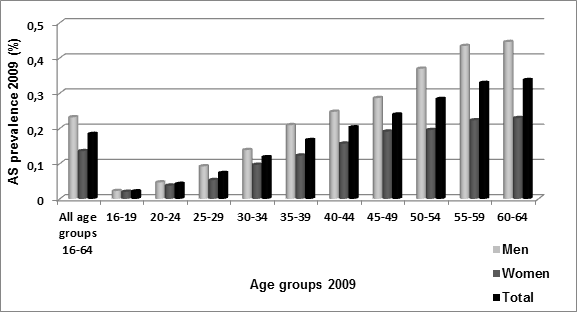Session Information
Session Type: Abstract Submissions (ACR)
Background/Purpose: Reported Ankylosing Spondylitis (AS) prevalence estimates vary considerably, and there is a lack of nationwide estimates. Previous studies by our group support the validity of WHO International Classification of Disease codes (ICD-codes) for AS in the Swedish National Patient Register (NPR) and indicate that the mean diagnostic delay is about 10 years. This study aims to describe the national prevalence of diagnosed AS in Sweden, based on data from the NPR, overall as well as stratified by age and sex, and to explore treatment, geographical variation and socio-economic factors in the Swedish AS population.
Methods: All patients given a diagnosis of AS according to ICD-codes in the NPR between 1967 and 2009 were identified. Statistics Sweden, the Swedish biologic register (ARTIS) and the national drug prescription register were used to retrieve data on demographics, drug exposure, level of education and vital status. Our case definition required at least one registered AS diagnosis in inpatient care 1967- present) or specialized outpatient care (2001- present), not including primary care and private practice. Results are presented for individuals 16-64 years old in 2009.
Results: On 31 December 2009, Sweden had a population of approximately 9.3 millions, of which 64% were in the age group 16-64 years old and 50.8% were men. Between 1967 and 2009, 20 044 patients with at least one health care registration in the NPR with a diagnosis of AS were identified. Of those, 11 030 were 16-64 years old, alive and living in Sweden on Dec 31, 2009. The overall prevalence of AS in this age group in 2009 was thus 0.18%. The prevalence increased linearly with age up to the age of 55 years, after which it leveled off. For all investigated age groups combined, men had a higher prevalence compared to women (0.23% vs 0.14%). During 2009, NSAIDs, DMARDs, corticosteroids and TNF-inhibitors had been prescribed to the AS patients in 53.4%, 20.4%, 11.7% and 14.2% respectively. Prevalence estimates by health care region revealed the highest age-/sex-standardized prevalence in the Northern Health Care Region (0.24%; 95% CI 0.23-0.25). The association between level of education and AS prevalence was explored only in those > 30 years old on Dec 31, 2009. The age-/sex-standardized prevalence of AS was lowest among those with > 12 years of education (0.20%; 95% CI 0.19-0.21), while somewhat higher prevalences were observed in the other two strata with a shorter formal education (≤ 9 years and 10-12 years) (0.24%; 95% CI 0.22-0.25 and 0.24%; 95% CI 0.23-0.24).
Conclusion: This nationwide, register-based prevalence estimate of AS in Sweden offers a unique opportunity to better understand the burden of AS to the healthcare system. Moreover, geographic and socio-economic differences in prevalence estimates suggest that genetic and possibly also environmental factors may be important for disease development and detection.
Disclosure:
S. Exarchou,
None;
U. Lindström,
None;
J. Askling,
None;
J. Eriksson,
None;
H. Forsblad-d’Elia,
None;
L. E. Kristensen,
None;
M. Neovius,
None;
C. Turesson,
None;
L. T. Jacobsson,
None.
« Back to 2014 ACR/ARHP Annual Meeting
ACR Meeting Abstracts - https://acrabstracts.org/abstract/the-prevalence-of-ankylosing-spondylitis-in-sweden-a-nationwide-register-study/

